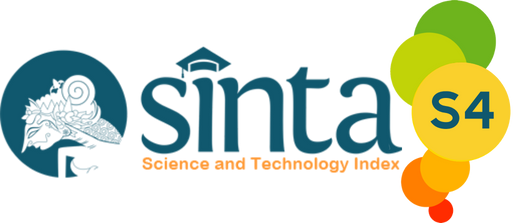Pengaruh Motivasi Terhadap Hasil Belajar Bahasa Jepang siswa Kelas X IPS 1 SMA Negeri Padang
DOI:
https://doi.org/10.24036/omg.v5i2.334Keywords:
Pembelajaran, Bahasa, Jepang, Motivasi, SiswaAbstract
This research is motivated by the assumption that motivation affects Japanese learning outcomes. The purpose of this study was to determine the effect of motivation on Japanese language learning outcomes for students of class X IPS 1 SMA Negeri 8 Padang.
This research method is a quantitative method. This study using purposive sampling, namely the technique of determining the sample with certain considerations. The subjects of this study were all students of class X IPS 1 SMA Negeri 8 Padang totaling 38 people. The instruments used in this study were tests and non-tests. The test in this study was taken from the student learning outcomes document, while the non-test was a motivational questionnaire. The data processing technique uses a Likert scale (Very high = 4, High = 3, Normal = 2, Low = 1). The data analysis technique used a simple regression analysis technique to answer the motivational research on learning outcomes.
The results of this study indicate that there is a positive and significant effect of learning motivation on learning outcomes of Japanese language subjects for students of Class X Social Sciences 1 SMA Negeri 8 Padang, a significance value of 0.045 <0.05 was obtained. With the value of r-square = 0.107, which means the influence/contribution of motivation to learning outcomes is 10.7%. In conclusion, motivation affects learning outcomes.References
Andrie, Andhika Putra. 2015. Pengaruh Motivasi Belajar dan Perhatian Orang Tua Terhadap Prestasi Belajar Akuntansi siswa Kelas X Akuntansi SMK Negeri 1 Yogyakarta Tahun Ajaran 2014/2015.Skripsi: FE UNY
Arikunto, S. 2010. Prosedur Penelitian Suatu Pendekatan Praktik, Jakarta: PT Rineka Cipta
Munawaroh, M. 2011. Pengaruh Minat dan Motivasi Terhadap Prestasi Belajar Bahasa Jepang Siswa Kelas XI Kayu SMK Negeri 2 Adiwerna Tegal (Doctoral dissertation, Universitas Negeri Semarang).
Sepwanda, Monika. 2020. “Persepsi Siswa Terhadap Card Sort Sebagai Media Pembelajaran Hiragana”. Omiyage : Jurnal Bahasa Dan Pembelajaran Bahasa Jepang, 4(1), 42-50.
Sugiyono. 2013. Metode Penelitian Kuantitatif Kualitatif R&D. Bandung: Alfabeta 2017. Statistik untuk penelitian. Bandung: alfabeta
_______. 2015. Metode Penelitian Pendidikan (Pendekatan Kuantitatif,Kualitatif, dan R&D. Bandung: Alfabeta.
Sutedi, Dedi. 2011. Penelitian Pendidikan Bahasa Jepang. Bandung: Humaniora.
https://idtesis.com/komponen-kurikulum-menurut-uu-20-tahun-2003/ (diakses 24 Januari 2021)
https://jdih.kemenkeu.go.id (diakses 7 Januari 2021)









